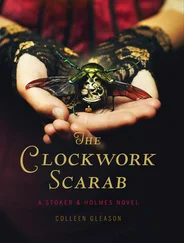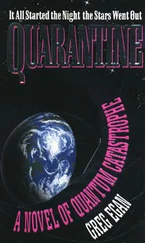Greg Egan - The Clockwork Rocket
Здесь есть возможность читать онлайн «Greg Egan - The Clockwork Rocket» весь текст электронной книги совершенно бесплатно (целиком полную версию без сокращений). В некоторых случаях можно слушать аудио, скачать через торрент в формате fb2 и присутствует краткое содержание. Жанр: Фантастика и фэнтези, на английском языке. Описание произведения, (предисловие) а так же отзывы посетителей доступны на портале библиотеки ЛибКат.
- Название:The Clockwork Rocket
- Автор:
- Жанр:
- Год:неизвестен
- ISBN:нет данных
- Рейтинг книги:3 / 5. Голосов: 1
-
Избранное:Добавить в избранное
- Отзывы:
-
Ваша оценка:
- 60
- 1
- 2
- 3
- 4
- 5
The Clockwork Rocket: краткое содержание, описание и аннотация
Предлагаем к чтению аннотацию, описание, краткое содержание или предисловие (зависит от того, что написал сам автор книги «The Clockwork Rocket»). Если вы не нашли необходимую информацию о книге — напишите в комментариях, мы постараемся отыскать её.
The Clockwork Rocket — читать онлайн бесплатно полную книгу (весь текст) целиком
Ниже представлен текст книги, разбитый по страницам. Система сохранения места последней прочитанной страницы, позволяет с удобством читать онлайн бесплатно книгу «The Clockwork Rocket», без необходимости каждый раз заново искать на чём Вы остановились. Поставьте закладку, и сможете в любой момент перейти на страницу, на которой закончили чтение.
Интервал:
Закладка:
“Let’s just strap the whole city to a rocket and get it over with,” Yalda suggested. “Let Red Towers flourish in splendid isolation in the void for an age or two, then they can come back and teach the world how to live.”
They only had a couple of bells before the show, so they went to the hall to familiarise themselves with the layout. Yalda hadn’t been able to bring the equipment to produce the projected backdrops they’d used in Zeugma, but Giulio had organized printed sheets bearing the same material, which would be handed to the audience as they entered. That meant keeping the general lighting on during the performance.
“Seeing all those faces is going to make me anxious,” she told Eusebio, standing on the stage at the front of the empty hall.
“Don’t worry, you’re a professional now.” He squeezed her shoulder reassuringly.
The solution only came to her when she finally stepped out in front of the crowd: she delivered exactly the same message as in Zeugma, but she shifted her attention to her rear gaze and focused on the blank wall behind her, allowing herself to imagine that all the people in the hall were staring, not at her, but at the same soothing whiteness.
After Eusebio had done his part—with a few changes from the original version in which he’d boasted of a rocket the size of a mountain—it was time for questions. Everyone they’d spoken to in Red Towers had told them that they’d have to take questions from the floor; it was the custom here, and if they defied it they would not be forgiven. Giulio—whose employers had paid half the cost of renting the hall, in exchange for the right to display the paper’s name prominently throughout the venue—joined Yalda and Eusebio on stage to moderate.
Yalda braced herself for the predictable “Why can’t I walk to yesterday?” jokes, or perhaps even the perennial “Where’s your co?”
The first questioner Giulio selected, an elderly man, called out, “How will you keep the machinery repaired?”
Eusebio said, “There’ll be workshops within the rocket, equipped for every eventuality.”
The man was unimpressed. “And factories? Mines? Forests? ”
“There’ll be stocks of minerals,” Eusebio said, “and gardens for raw materials as well as for food.”
“Stocks to last an age? Soil to last an age? All inside one tower? I don’t think so.”
Giulio chose another questioner.
“How will you control the population?” the woman asked.
“At the moment we have more of a shortage of travelers than an excess,” Eusebio replied.
“Double that number a few dozen times,” she suggested, “then tell me where you’ll put them, and how you’ll feed them.”
Eusebio was beginning to look flustered. Yalda said, “There’ll be the same mortality rates on the rocket as we experience anywhere else. No city’s population actually doubles in a generation.”
“So there’ll be no progress in medicine, then? For era after era, the only thing these travelers will care about is dealing with the Hurtlers… which no longer even threaten them?”
Yalda said, “Progress in medicine could end up controlling population growth as much as it lowers mortality.”
“ Could —but what if it doesn’t?”
The questions continued in this fashion: tough but undeniably pertinent. It felt like an eternity before Giulio called a halt; Yalda was so exhausted that it took her a moment to realize that the audience was now cheering enthusiastically.
“That went well,” Giulio whispered to her.
“Really?”
“They took you seriously,” he said. “What more did you want?”
In the foyer, they recruited more than three dozen ground crew volunteers, but no passengers. People here were far more willing than their cousins in Zeugma to accept Yalda’s premise about the Hurtlers, and even the abstract principle behind Eusebio’s solution—but no one was confident that he could build the kind of habitation in which they’d want their own grandchildren to spend their entire lives.
The servant ushered Yalda, Nereo and Eusebio into the dining room, then withdrew.
Paolo was standing at the far end of the room, flipping through a thick stack of papers. He looked younger than Yalda had expected, perhaps a bit more than two dozen years old. He put the papers down on a shelf and approached, gesturing at a wide circle of cushions on the floor. “Welcome to my home! Sit, please!”
Nereo introduced Yalda and Eusebio. Yalda tried not to be intimidated by the opulence of the room; the walls were decorated with an abstract mosaic, and there was a bewildering array of food spread out in front of them, almost none of it familiar to her. To her eye, there was enough to feed at least a dozen people—and when six young men entered the room, the quantity began to seem almost reasonable—but it turned out that Paolo’s sons were just passing through to greet his guests, and would not be joining them.
Six sons! Had he adopted some of them, or taken two co-steads? Either way, if it was a family tradition the house would be overflowing with grandchildren.
The formalities over, Paolo sat with them and urged them to start eating. Yalda made a conscious decision not to hesitate—not to stare at the dishes and try to guess their origins. She was confident that nothing here would be too repellent, let alone dangerous, so it didn’t really matter that she had no idea what she was putting in her mouth. The first few flavors were strange, but not unpleasant. She decided to adopt a fixed expression of mild enjoyment and maintain it throughout the meal, regardless.
Paolo addressed Eusebio. “I’ve heard about your rockets; an extraordinary venture.”
“It’s only just beginning,” Eusebio replied. “To send people safely into the void will take many more years of work.”
“I admire the audacity of your vision,” Paolo said, “and I appreciate that the Hurtlers might well become dangerous. But what exactly do you think your travelers will bring back from a trip into empty space?”
“That’s difficult to predict,” Eusebio admitted. “Imagine, though, how wondrous our cities would appear to a visitor from the eleventh age. They had no engines, no trucks, no trains. Only the crudest lenses. No reliable clocks.”
“But what comes next?” Paolo wondered. “An engine that runs a little more smoothly? A clock that loses no time in a year? Undoubtedly civilized refinements, but how would they safeguard us against the Hurtlers?”
Eusebio said, “Have you heard of the Eternal Flame?”
Yalda was glad she’d already committed to a policy of benign inexpressiveness.
Paolo buzzed amiably—not mocking his guest, but treating this invocation as if it could only have been meant as deliberate, flippant hyperbole.
Eusebio’s tone remained scrupulously polite, but Yalda could see him struggling to keep his frustration in check. “The old stories of the Eternal Flame were misguided in their details,” he said, “but modern ideas suggest that such a process might actually be possible.” He turned to Nereo. “Am I wrong about that?”
Nereo said cautiously, “Rotational physics doesn’t rule it out immediately, the way our earlier understanding of energy did.”
Paolo was surprised. “Honestly?” He put down the loaf he’d been chewing. “So all those wild-eyed alchemists might simply have given up too soon? Ha!” He shot Nereo a reproving glance, as if his science adviser might have thought to mention such an interesting fact a few years earlier.
Eusebio said, “Sir, may I tell you one message we received very clearly from the people of Red Towers last night?”
“Certainly,” Paolo replied.
“My venture, as it stands, is too modest,” Eusebio confessed. “Nobody believes that a few dozen people in a vehicle perhaps the size of this compound could survive long enough to reap the benefits of their situation. The basic physics of the trajectory puts no limit on the length of their journey—no limit on the advantage they could have over us in years. But the practicalities of their situation will be the determining factor. A robust society requires a certain scale, in both people and resources. An isolated camp in the desert with well-chosen supplies might endure for a generation or two, but it takes a whole city to flourish for an age.”
Читать дальшеИнтервал:
Закладка:
Похожие книги на «The Clockwork Rocket»
Представляем Вашему вниманию похожие книги на «The Clockwork Rocket» списком для выбора. Мы отобрали схожую по названию и смыслу литературу в надежде предоставить читателям больше вариантов отыскать новые, интересные, ещё непрочитанные произведения.
Обсуждение, отзывы о книге «The Clockwork Rocket» и просто собственные мнения читателей. Оставьте ваши комментарии, напишите, что Вы думаете о произведении, его смысле или главных героях. Укажите что конкретно понравилось, а что нет, и почему Вы так считаете.










